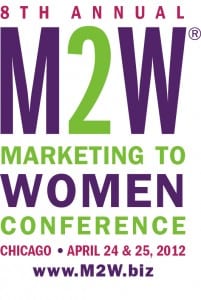 This year’s Marketing-to-Women (M2W) Conference was packed full of research, data, cases and companies that show how marketing-to-women makes great business sense. Not surprising, given it is a marketing-to-women conference. It was even suggested that “marketing-to-women” be called simply “marketing” after a research presentation based on interviews with 20,000 consumers worldwide revealed that women’s purchasing power globally exceeds 20 trillion USD.
This year’s Marketing-to-Women (M2W) Conference was packed full of research, data, cases and companies that show how marketing-to-women makes great business sense. Not surprising, given it is a marketing-to-women conference. It was even suggested that “marketing-to-women” be called simply “marketing” after a research presentation based on interviews with 20,000 consumers worldwide revealed that women’s purchasing power globally exceeds 20 trillion USD.
There were, however, two topics that emerged that did take me by surprise and will have implications in the years to come for us and for our clients.
Well Being
First, regardless of category, agency or presentation, the topic of “well-being” was pervasive. Not health, not nutritious, good-for-you, not wellness. But rather the holistic, over-arching idea of well-being in all facets of life and how products and services need to tap in to and ladder up to huge consumer desire for greater well-being.
Examples ranged from “telling the whole truth about ingredients in food products” and “less sexualized images of women in the media” to “home design with washers and dryers located near the bedrooms” to “finding a five-minute escape in the day to simply be alone and think.” We’ll need to help our clients understand and help them tell stories of how their products fit into this growing need for well-being.
The Coming Storm
Second, there was a research presentation by GfK Roper that called out Gen Z, or millennial, women and some very compelling data that will have major implications for marketers. Gen Z women are the most educated generation ever. Good news, right? However, they are also the most dissatisfied with their lives, compared to all other generations of women and men, including their male Gen Z counterparts.
The challenge? As they earn more degrees and subsequently more money, the pressure of them being the primary income earner and facing motherhood is wreaking havoc with their satisfaction. Many of them are already opting out of traditional work to start businesses.
What will happen as more millennial women become mothers? Will more opt out and then buy products/services from other mompreneurs vs. bigger companies? Will women delegate their purchasing power to husbands/fathers? Will new products and services arise to provide more support for working moms? Will these vocal moms band together and create more flexibility in the workplace?
Many questions, and opportunities, for our clients in the next few years in both of these areas.


